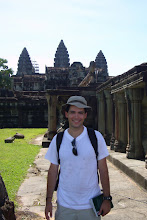I´m writing this from a slightly danky Internet/business office place in Barcelona, down the block from our hotel. It´s a lovely day in this city, cloudy but warm (warm certainly by standards that were set in Madrid, and even compared to Jerusalem).
The trip, now in its 5th day and almost at its halfway point, continues to be exciting and fantastic. Spain is a great country. It´s beautiful, to start. And it feels so European, which, I´m slightly ashamed to say, was a bit surprising. I guess I expected something more Mediterranean. And Spaniards are incredibly nice and attractive. It must be something in the sun and wine. My Spanish really isn´t coming back, drips here and there, but when I hear people speaking Spanish and need to respond, my brains default foreign language is Hebrew, and that´s just been flowing out left and right. I guess that´s good for my Hebrew learning.
Madrid, where Jason and I started out Monday morning, is a fantastic city. It´s old and yet feels fresh and relevant. It´s huge and sprawling, yet feels at times, intimate and very non-alienating. Jason put it best, I think, when he said it was not overwhelming, but still feels full of life. I think that was a very apt description. It´s a real city - one filled with history and culture - but not one consumed with a "touristy" feeling. At the same time, in the three days we were there, I never felt bored; there was always something to do and I could have stayed for another week and explored more and more.
We focused our visit on the two main art museums - the Reina Sofia on the first day and El Prado on the second. I really enjoyed them both; the Reina Sofia focused more on modern and contemporary Spanish artists, really the 20th century. The contemporary stuff was fine and weird - there was this fascinating photo exhibit of an apparently famous photographer who autobiographically showed the rebellious life in a post-Franco era 1980s. The surrealism and cubism was great;
Guernica, I think, was the highlight for both Jason and myself. As great a museum the Reina Sofia was, El Prado, which we saw on our second day, was fantastic. It was a huge, huge building filled with art from the Renaissance to the mid 19th century. The Spanish collection -
Las Meninas, Zubaron´s still lifes (thank you art history class), El Greco, Goya (I never was a fan of his until this week) - was fantastic. And all the rest. The museum seemed to be greatly curated - but it´s all in Spanish - so we did the audio guide, which really enhanced the experience.
Barcelona, as a city, seems a lot more touristy. It´s only been a day +, so I can´t say for sure, but I´m not as impressed with it as Madrid. It feels much more intense and active, less like a city, and the people don´t seem as friendly. The architecture, however, is amazing. The whole Moderisme kick, with the Gaudi and Co., really makes the city stand out. Yesterday we went to the Sagrada Familia, which may been one of the most amazing buildings I´ve ever seen. It was incredible - all of the stone and the sculpture and the stylized decorations. I would definitely come back to Barcelona when it´s finished, in like 30+ years.
And then, of course, there´s the food. Our firs day in Madrid we ate really well - a delicious fixed lunch menu which is all over the country; for me I had fiedgua (Paella with noodles instead of rice) and rabbit - and then a big paella dinner. Our last morning in Madrid we indulged in
churros y chocolate, hot churros that come with a cup of rich, hot dipping chocolate. The wine, as well, is fantastic. Even cheap, house wine, is really tasty. We also had some great
tapas here and there, especially dinner last night at a hard core tapas bar in Barcelona´s old city - the bar is covered with 2-3 bite canapes, from fish to meat to cheese to sweets, each one with a skewer. You help yourself and at the end pay by skewres. Talk about finger food. Not eating pork is hard, really hard, but I think I´m doing all right for myself.
The biggest highlight of the trip so far (sorry museums) was seeing my friends Stephanie and Michelle. They were friends in LA, who moved to Madrid in the spring to teach English indefinitely (Steph is also and EU citizen, and Michelle, well, avoids the immigration officials), and Jason and I met up with Stephanie Tuesday night, and she brought us to a hangout with some of her and Michelle´s friends. Wednesday evening, before we went to Barcelona, we met up with Steph for a walk and cider & tapas as well.
Now we´re off to the Picasso museum, and then a stroll around the old city, and then the Barcelona Chocolate museum, and then tonight we´re going to try and find the Progressive community in Barcelona for services (it being Friday and all). tomorrow is our last day, and I´m trying to convince Jason to go to the Barcelona Sex/Erotics museum - a kitschy delight! - but he´s not having any of it. Probably see some more moderisme buildings and the Olympic Park. And then, I´m off to Paris, where I meet up with Tom and Dana. I´m super pumped for that leg, more new cities, new art to see, and new foods to eat.
























